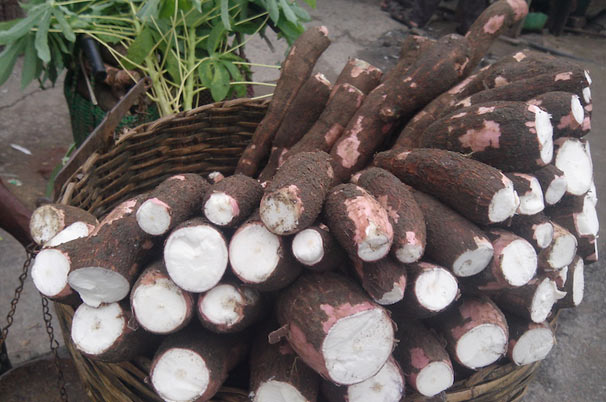
The International Institute for Tropical Agriculture (IITA) is currently seeking approval from the Nigerian government to conduct confined field trials (CFT) of cassava genetically engineered to prolong root storage the most nagging challenge of cassava breeders.
The trials, which would be carried out by IITA in collaboration with several universities in Switzerland and Germany, would test cassava bred to resist deterioration using a gene-silencing technology.
Nigeria’s National Biosafety Management Agency (NBMA) is reviewing the application. It attracted outcry from Nigerian civil society groups alleging that the new genetic engineering experiment, which has never been tried before, portends danger for Nigerian and African agriculture.
However, a team of scientists working on the project at the IITA said the transgenic cassava pose no threat to the nation. Knowledge gained from testing the line will give cassava breeders a better understanding of how to preserve the storage roots for longer periods without losing the crop’s vital nutrients, they said.
Meanwhile, Rufus Ebegba, director general of NBMA, also assured Nigerians that there is no cause for alarm, saying all safety procedures are being followed in considering the Institute’s application to field test the genetically engineered cassava.
Cassava s growing season is usually 12 or more months, and harvested roots must be immediately processed after harvest to avoid rapid deterioration. The IITA scientific team said cassava production could become more efficient and profitable based on an improved understanding of its growth and formation of storage roots.
Cassava is a very important staple crop for food and income in Nigeria. It is one of the most efficient crops for the production of starch, and is increasingly processed for flour and other products. It is drought tolerant, and can resist or tolerate many of the expected impacts from climate change.
In an exclusive interview with the Alliance for Science, the scientists led by Dr. Robert Asiedu, IITA director for West Africa Hub said the trait being tested is very important because it is related to a delay in the deterioration of starch in cassava storage roots following harvest.
When cassava is harvested, the storage roots have to be processed within a short period of time (about 24 hours) because of enzyme activity, Asiedu explained. This puts a severe limitation on the time between harvesting of cassava storage roots, transportation from harvest sites to processing centers, and processing them into more stable products. The transformed (GE) cassava will deactivate the enzyme that causes deterioration of starch when the roots are harvested.
Asiedu noted that the trial is a basic research project to study expression of a gene that has been taken from potato and inserted into a cassava experimental genotype, saying it is expected that the cassava line will be able to store its starch in stable form long after the tubers have been harvested.
He added that the knowledge gained from testing the line will give cassava breeders a better understanding of the natural genetic control of the trait that they can use in developing new varieties that will have storage roots that can keep for several days without deterioration of the starch.
Asiedu allayed fears that the trial is a guise to take total control of Nigeria s food system, stressing that the trial is currently for research and study purposes only and has not yet gotten to the stage where farmers can plant it.
The line to be tested in the trial is not intended to get into the hands of farmers, Asiedu said. The purpose of this trial is to use transgenic plants as an advanced tool to study the basic biology of photosynthesis, starch production, and breakdown in cassava. The knowledge or understanding obtained will contribute to future breeding strategies for cassava improvement, e.g., for early maturation, increased yield, and starch quality.
Asiedu added: None of the transgenic plants will be part of breeding programs nor will they be released outside the confined field site.
Ebegba noted that scientists experiment and make discoveries every day, adding that though the technology has not been tested before, Nigeria has the competent personnel and equipment to safely regulate it.
We have constituted a National Biosafety Committee to take a look at the experiment, Ebegba said. “This committee is made up of nine ministries and agencies. We ve also constituted another one, the National Biosafety Technical Committee. It is also made up of notable scientists who have experience in cassava-related fields and are also knowledgeable in nutrition. The essence of that is to have these two committees work together and advise the agency.
The agency has enough competent personnel but the committees are very important to advise the agency, and also give the process some level of transparency, Ebegba continued. So once the committee submits the report we ll look at it. We re also already making our in-house analysis of the application, looking at the gene of insert and the location of the insertion of the gene to see the likely consequences. When we conclude our findings then they ll be made public and everybody would be free to look at it.
Ebegba urged Nigerians not to worry, but to allow scientists do their job. He said regulations and laws exist to govern such research. The application will be approved if it meets all the necessary requirements, he said, but it will be turned down if it poses any form of risk or threat to the Nigerian public.
Nkechi Isaac is the Alliance for Science Nigerian correspondent and a 2016 Global Leadership Fellow.
